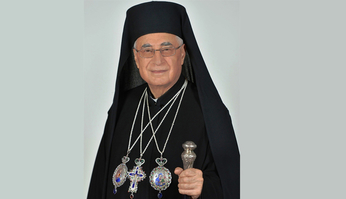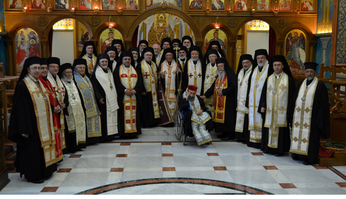صاحب الغبطة يوسف
I Am With You Always
“I Am With You Always”
A collection of Pastoral Letters for Christmas and Pascha
by Patriarch Gregorios III of Antioch . 216 pages
ISBN: 1-892278-86-3
Published by Eastern Christian Publications
This collection of Letters from 2000-2007 is now available in English for the first time. Combining Eastern Christian theological insight, practical ethical guidance and ecumenical and inter-religious reflection, this book offers hope for a divided world.
Price: $20.00 (plus shipping & handling)
Order online under New Books at: www.ecpubs.com
.jpg)
Epistles from the East
“I Am With You Always: pastoral letters of Patriarch Gregorios III”
Patriarch Gregorios III of Antioch
Eastern Christian Publications, Fairfax, Virginia, USA $20
It should not come as a shock, yet it often surprises Roman Catholics, that the term “Catholic” is not synonymous with “Roman.” It actually applies to 23 churches: the largest is, indeed, the Latin (Roman) Church, but the others are Eastern Churches from various traditions, in communion with each other.
One of these, the Greek-Catholic Melkite Church is part of the family belonging to the ancient Church of Antioch, a sister Church of the Greek-Orthodox patriarchate of Antioch and part of the world-wide community of Churches using the Byzantine Rite. Traditionally it has been associated with the cradle of Christianity in the Middle East, but, due to emigration, is found in Canada, the United States, Australia, Latin America and Europe, including a presence in Britain. This Church forms part of what is known as the “living stones,” Arab Christians of the Middle East living in close proximity to Islam and frequently in circumstances of great difficulty. Juridically organised as a Church sui iuris, its head, the Patriarch of Antioch, has an important pastoral role, not only in the patriarchal territories of the Middle East, but amongst the dioceses and communities spread throughout the world. Structurally and stylistically these works reflect the Arabic idiom. But the translator has rendered good service. Although the bulk of them concern the meaning of Christmas and Easter, much of what he writes about is specifically pertinent to his particular faithful; issues such as emigration, leaving the “motherland” and so on, are still raw as the Middle East is progressively de-Christianised. Other letters deal with the practicalities of life in the various parts of the Church. But there are also inspiring and prophetic insights that speak to the Western Churches, especially where they concern dialogue with other religions, in particular Judaism and Islam.
The Catholic Melkite Church is a reminder of a vibrant and living theological tradition different from the West, reflecting the constant Eastern theological witness to the life of the Trinity and the work of the Holy Spirit throughout history. It is good to hear its voice in collections such as this, not because it is a major work of theology - the book does not claim to be that - but because it is an authentic voice calling us all to a renewed vision of what it means to be a truly inclusive Church.
In the letter for Christmas 2005, entitled, “The unifying Incarnation,” Patriarch Gregorios gives a wonderful pastoral exegesis on ecumenism, particularly the role of his own Church in the past (a witness not often helped by Rome.) Citing the letter of Peter III of Antioch to the Patriarch Michael Cerularius, he points out the necessity of reunion with the East: “I have been wondering about this division of the Church and how one might think it possible to set aside the successor of the great Peter and separate him from the divine body of the Churches, so that his voice can no longer be heard in the meeting of the bishops and he no longer takes his part in the cares of the Church, so that he too may receive from them fraternal and pastoral direction.”
This is a timely reminder to the Latins that other Churches, as valid and at least as ancient as the Roman tradition, regard them from different positions. It is a witness to the fact that the Body of Christ needs to breathe with both lungs of East and West, as the Melkite Patriarch, Maximos IV, reminded the bishops at the Second Vatican Council. But the themes of these letters go beyond Christian issues. The patriarch deals with the necessity of dialogue with Islam. In calling attention to what has been and what is going on, he projects a particularly visionary image, “The Church of Islam,” a vision of Christians who “excel in their relations with Muslims.” He pushes the image even further when he reminds us that Christians must go beyond themselves and their Church and become really “catholic,” that is, of all and for all, which unites itself with all “cultures, civilisations, languages and ethnicities.”
This is a remarkable collection of pastoral letters whose unifying force is that great sense of joy so evident in Eastern Christianity. They offer hope: “in the Eastern Church where the Resurrection takes first place in the life of Christians.” They offer eloquent testimony to the continuing work of the apostles, bearing witness in a practical and spiritual way to the Resurrection in faith, hope and love.
Robin Gibbons
Author of “House of God: House of the People of God” SPCK 2006
This article first appeared on 10 January 2009 in The Tablet - Weekly Catholic newspaper http://www.thetablet.co.uk/ and is reproduced by kind permission of the publisher.

